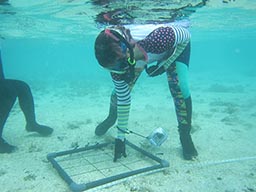- ABOUT US
- PROGRAM AREAS
- CONSERVATION APPROACH
- EDUCATION
- MULTIMEDIA
- Coral Heroes: The Coral Restoration Consortium
- Coral Heroes: FORCE BLUE
- Coral Heroes: Dr. Ruth Gates
- Coral Heroes: Reef Resilience Network
- Coral Heroes: The Micronesia Conservation Trust
- Coral Heroes: The National Marine Sanctuary Foundation
- Coral Heroes: The National Fish and Wildlife Foundation
- Coral Heroes: The International Coral Reef Initiative
Coral Heroes: The Gulf and Caribbean Fisheries Institute
Throughout the Coral Reef Conservation Program’s 20th Anniversary, we are highlighting Coral Heroes — individuals and organizations that have worked with the program and are making a real difference in coral reef conservation.

Fish are an integral component of a healthy and productive coral reef ecosystem. When fish numbers are reduced or destructive fishing tactics are used, coral reefs - and the local livelihoods and national economies that they support - suffer. In fact, NOAA’s Coral Reef Conservation Program recognizes the improvement of fisheries sustainability as a key activity in conserving coral reef ecosystems.
The Gulf and Caribbean Fisheries Institute was founded over 70 years ago to provide a platform for information exchange on marine resource management in the Gulf of Mexico and Caribbean regions. The organization brings together decision-makers, scientists, managers, educators, resource users including fishers, and students in order to advance the goals of sustainable use, wise management, conservation, and restoration of marine and estuarine fisheries and resources. Alongside traditional topics in fisheries and marine management, the organization also addresses emerging issues such as invasive lionfish, the pelagic sargassum influx, stony coral tissue loss disease and is serving as co-host for the UN Global Partnership on Marine Litter’s Caribbean Node.
MPAConnect is one of many initiatives that the organization spearheads.
“MPAConnect is a learning network among Caribbean marine natural resource managers. We seek to build management capacity for the implementation of effective marine protection to help participating countries achieve their conservation commitments,” explains Emma Doyle, MPAConnect Coordinator for the Gulf and Caribbean Fisheries Institute.
MPAConnect is a joint initiative of the organization and NOAA’s Coral Reef Conservation Program with 32 priority coral reef marine protected areas in 11 Caribbean countries and territories. The participating countries and territories are currently Mexico, Belize, Honduras, The Bahamas, the Turks and Caicos Islands, the British Virgin Islands, Saba and St. Eustatius in the Caribbean Netherlands, Saint Lucia, Saint Vincent and the Grenadines, and Grenada, as well as the US Virgin Islands.
“We’re focused on peer-to-peer sharing of best practices on management themes identified as priorities by network members through management capacity assessments that were administered in 2017 and 2011. Typically, one major in-person regional peer learning exchange is held per year,” Emma comments.

Peer-to-peer learning exchanges have focused on topics including sustainable finance strategies, enforcement, socioeconomic and biophysical monitoring, fisheries management, strategic communications, and stony coral tissue loss disease detection and response.
At the site level, the network also coordinates technical assistance and small grant support for follow-up projects that respond to needs identified by the managers and enable them to apply best practices at their sites.
“The members of the network generously share their experience with each other and contribute their time for peer sharing and mentorship. We sometimes work with other sites and other regions to share experience, including the Pacific Ocean and Coral Triangle. We have so far brought together 60 marine protected areas to share knowledge and more than 500 managers have participated in our activities,” Emma adds.
We’re proud of our 10-year partnership with the Gulf and Caribbean Fisheries Institute and look forward to many more years working together on sustainable fisheries.
Follow the celebration on our Facebook and Twitter pages and the National Ocean Service Instagram page all year using the hashtag #NOAACoral20th.
Related Stories and Products
About Us

The NOAA Coral Reef Conservation Program was established in 2000 by the Coral Reef Conservation Act. Headquartered in Silver Spring, Maryland, the program is part of NOAA's Office for Coastal Management.

The Coral Reef Information System (CoRIS) is the program's information portal that provides access to NOAA coral reef data and products.
Work With US
U.S. Coral Reef Task Force
Funding Opportunities
Employment
Fellowship Program
Contracting Assistance
Graphic Identifier
Featured Stories Archive

Access the archive of featured stories here...
Feedback
Thank you for visiting NOAA’s Coral Reef Conservation Program online. Please take our website satisfaction survey. We welcome your ideas, comments, and feedback. Questions? Email coralreef@noaa.gov.
Stay Connected
Contact Us
NOAA’s Coral Reef Conservation Program
SSMC4, 10th Floor
1305 East West Highway
Silver Spring, MD 20910
coralreef@noaa.gov
